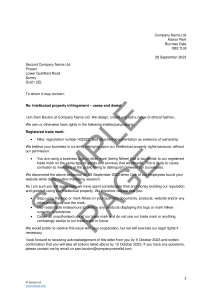When you’re thinking about how to best protect your intellectual property (IP), you should make sure you have a cease and desist letter template handy to send to other businesses who might be infringing your rights. Simply registering your trade mark, design or patent isn’t enough to protect it from being copied, so you’ll need to monitor what your competitors are doing on a regular basis and send them a cease and desist letter as a first step if they are infringing your rights. This blog discusses how to create your cease and desist letter, as well as what to do if you receive a cease and desist letter from someone else.
Sending a cease and desist letter
What is it?
A cease and desist letter is a letter demanding that a business stops doing something, eg to stop using someone else’s trade mark. It has no legal force and you can’t use it to make the other business pay you compensation, but it can encourage the other business to stop what they are doing with a threat of legal action, especially if they didn’t realise they were infringing your IP rights.
When should I use it?
You should use a cease and desist letter if you believe someone is infringing your intellectual property. For example, you may have discovered that a website’s branding looks identical to yours, or that another company’s product is using the same technology that you have patented.
A cease and desist letter acts as a powerful deterrent to others who may be using your intellectual property. It tells them that you are aware of their breach of your rights and that you would like to resolve the situation in an amicable manner. By writing to the person you believe is using your intellectual property, you provide them with the opportunity to agree to stop using it without resorting to costly and time-consuming legal action.
In some circumstances you can be sued for making unjustified threats of legal action in relation to IP, so you need to make sure the person is actually breaching your intellectual property rights before you threaten action against them.
If you are unsure about whether someone is breaching your intellectual property rights, you should seek legal advice. You can access a specialist lawyer in a few simple steps using our Ask a Lawyer service.
What does our cease and desist letter cover?
Our cease and desist letter template sets out:
- who your business is;
- what intellectual property your business owns;
- why you believe the recipient is infringing your intellectual property rights; and
- what actions you require the recipient to take, and by when.
You can refer to multiple types of intellectual property in the letter.
To create your letter, simply follow this link, click ‘Get started’ and complete the questionnaire. You can save your answers for later, or download your letter as a PDF or Word document. Don’t forget to add your business’s letterhead and sign the letter.
Receiving a cease and desist letter
What should I do if I receive a cease and desist letter?
You shouldn’t ignore a cease and desist letter under any circumstances. Often a cease and desist letter signals that the sender is willing to take you to court if you do not stop doing the act complained about in the letter. Therefore, ignoring a cease and desist letter may encourage the other person to formally issue court proceedings. Also, if you do end up going to court over the dispute and lose, the court may make you pay the other person more money because you ignored their original letters.
You should always respond in private to the sender, and in a calm and reasonable manner. Being aggressive or inflammatory won’t help you to resolve the situation, and may well cost you more time, money and stress in the long run. Further, if you wrongly threaten to sue someone in relation to IP rights to try to get them to back off, you can actually open yourself up to being sued. It is also important to bear in mind that if you do end up going to court over the dispute and lose, the court will take into account your behaviour leading up to the court case when deciding how much money you have to pay the other person.
What should my response say if I know I am not infringing the sender’s intellectual property?
A cease and desist letter will describe the acts which the sender claims are infringing their intellectual property rights: for example, it may say you are selling goods using a logo similar to their trade mark. If you know for a fact that you are not doing the acts mentioned in the cease and desist letter, then you should send a polite but firm letter in reply explaining this. You should try to include some evidence for your claims (eg by enclosing a copy of your latest marketing campaign, which shows that you are not using the other person’s trade mark).
What should I do if I accept that I am breaching the sender’s intellectual property?
If you accept that your actions are infringing the sender’s intellectual property rights, you should stop using the sender’s intellectual property (this might involve changing your business name or logo, removing packaging which contains the infringing intellectual property, removing content from your website, or stopping sale of infringing products, among other things). Note that if you are not sure whether you are infringing or not, you should contact a lawyer.
You are not legally obliged to pay any money to the sender of a cease and desist letter, but you should politely respond and advise the sender that you have stopped the offending actions or that you will stop within a certain time frame. If you do end up going to court over the dispute and lose, the court will take into account your behaviour leading up to the court case when deciding how much money you have to pay the other person. Cooperating with the sender may help you avoid court proceedings (for example, the sender may want you to sign an agreement confirming that you will not infringe their intellectual property in future). However, before signing any legal documentation, it is best to consult a lawyer (for example, your lawyer may be able to arrange for the documentation to release you from past liability for your infringements). For access to a specialist lawyer in a few simple steps, you can use our Ask a Lawyer service.
What should I do if I am not sure whether I am breaching the sender’s intellectual property?
If you are unsure whether you are doing the acts mentioned in the cease and desist letter, or are unsure about whether you should stop those acts, then you should consult a lawyer. For access to a specialist lawyer in a few simple steps, you can use our Ask a Lawyer service.
A lawyer will be able to tell you whether you are indeed infringing someone else’s intellectual property rights and whether you have any defences that might protect you. However, you should always bear in mind that it can be expensive to use lawyers extensively, and there are several low-cost ways of resolving disputes that do not involve going to court or using lawyers.
Can I sue someone who has sent me a cease and desist letter?
If you receive a threat of a lawsuit which is completely unjustified, then you may be able to sue whoever sent the letter. However, this is an aggressive and expensive move, and should be done only as a last resort where someone is persistently threatening to sue you for something which you have not done.
The content in this article is up to date at the date of publishing. The information provided is intended only for information purposes, and is not for the purpose of providing legal advice. Sparqa Legal’s Terms of Use apply.

Marion joined Sparqa Legal as a Senior Legal Editor in 2018. She previously worked as a corporate/commercial lawyer for five years at one of New Zealand’s leading law firms, Kensington Swan (now Dentons Kensington Swan), and as an in-house legal consultant for a UK tech company. Marion regularly writes for Sparqa’s blog, contributing across its commercial, IP and health and safety law content.







